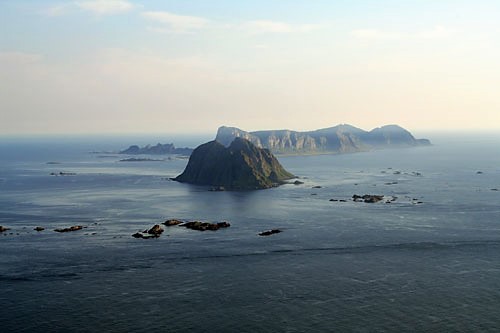The noun maelstrom denotes a powerful whirlpool in the sea or a river and, figuratively, a situation or state of confused movement or violent turmoil.
This word is from the early-modern Dutch noun maelstrom (now maalstroom — cf. etymological notes), originally a proper name designating a powerful whirlpool in the Arctic Ocean, off the west coast of Norway, which was formerly supposed to suck in and destroy all vessels within a wide radius; its Norwegian name is Moskstraumen or Moskenstraumen.
The early-modern Dutch noun maelstrom was also borrowed into:
– Danish as malstrøm,
– Swedish as malström,
– Norwegian as malstrøm,
– German as Mahlstrom,
– French as maelstrom.
The Maelstrom on a clear day; the islands of Mosken and Værøy can be seen in the distance.—photograph: Lofoten Islands

The Maelstrom was mentioned in The Mariners Mirrour (London, 1588), a translation by Anthony Ashley (1551/2-1628) of Spieghel der Zeevaerdt (1583-84), by the Dutch master sea pilot Lucas Janszoon Waghenaer (1533/34-1606).
It was also mentioned as Malestrand in The first voyage made by Master Anthonie Ienkinson, from the Citie of London toward the land of Russia, begun the twelfth of May, in the yeere 1557, by the English traveller and author Anthony Jenkinson (1529-1610/11) — he probably confused Maelstrom with the name Malestrand, now Marstrand, in southern Sweden:
We went north and by West, because we would not come too nigh the land, and running that course foure houres, we discouered, and had sight of Rost Islands, ioining to the main land of Finmarke. Thus continuing our course along the coast of Norway and Finmark, the 27 day we tooke the Sunne, being as farre shot as Lofoot, and had the latitude in 69 degrees. And the same day in the afternoone appeared ouer our heads a rainebow, like a semicircle, with both ends vpwarde. Note that there is between the said Rost Islands & Lofoot, a whirle poole called Malestrand, which from halfe ebbe vntill halfe flood, maketh such a terrible noise, that it shaketh the ringes in the doores of the inhabitants houses of the sayd Islands tenne miles off. Also if there commeth any Whale within the current of the same, they make a pitifull crie. Moreouer, if great trees be caried into it by force of streams, and after with the ebbe be cast out againe, the ends and boughs of them haue bene so beaten, that they are like the stalkes of hempe that is bruised.
from The principal nauigations, voyages, traffiques and discoueries of the English nation (London, 1599)
The American author Edgar Allan Poe (1809-49), in A Descent into the Maelström (Graham’s Lady’s and Gentleman’s Magazine, Philadelphia, May 1841), and the French novelist Jules Verne (1828-1905), in Vingt mille lieues sous les mers (Twenty Thousand Leagues under the Sea – volume 2, Paris, 1870), described, with some exaggeration, the dangers of the Norwegian current.
The earliest figurative use of English maelstrom that I have found is from The Public Ledger, and Daily Advertiser (London) of Friday 2nd January 1818, which published an article about parodies by the English satirist William Hone (1780-1842):
No individuals are warmer advocates for liberty, when properly defined, than ourselves; but we contend, that if the dissemination of these insidious libels be tolerated, our religious and political institutions will soon be prostituted at the shrine of anarchy and rebellion, and consequently our persons and property in perpetual danger. All will rapidly verge to the dreaded Maelstrom of revolutionary horrors.
The earliest known figurative use of maelstrom in French is from a letter that the French novelist and short-story writer Gustave Flaubert (1821-80) wrote in January 1857 about the accusation of immorality resulting from the serialised publication of Madame Bovary:
C’est un maelstrom de platitudes, de mensonges et de bêtises !
It is a maelstrom of platitudes, lies and stupidities!
Literally meaning whirlpool, Dutch maalstroom is from the verb malen, to grind, to whirl round, and the noun stroom, stream — malen is related to the English noun meal in the sense of powder made of crushed grain, and stroom is related to the English and German nouns stream and Strom.
Of Germanic origin, meal is related to Dutch meel, German Mehl, Icelandic mjöl, Swedish mjöl and Danish mel.
All the major Germanic languages except English have a derivative verb with the sense to grind: Dutch malen, German mahlen, Icelandic mala, Swedish mala, Danish male and Norwegian male.
These Germanic words are from a root shared by:
• Latin:
– mŏla, a millstone, and, usually in the plural, a mill — cf. immolate,
– mŏlĕre, to grind,
– mŏlāris, a millstone, a molar tooth;
• ancient Greek:
– μύλη (= múlē), μύλος (= múlos), a millstone, a mill,
– μύλαι (= múlai), molar teeth.
The French and English nouns moulin and mill are respectively from the Late-Latin words molinum and molina, meaning a mill, which were noun uses of the Classical-Latin adjective mŏlīnus, meaning of, or belonging to, a mill.
